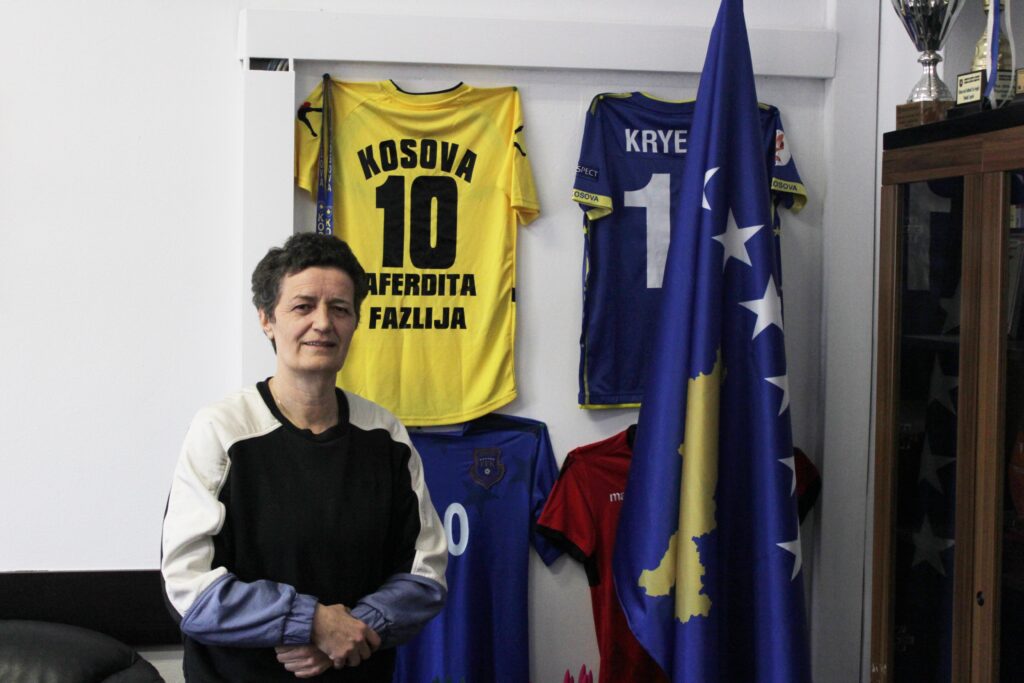Stones and dirt surround a small football field in a village deep in Malisheva. This synthetic, wire-fenced terrain serves a group of teenage girls pursuing a passion, an identity, a dream, and a desire to break barriers in a world that often seems closed to them.
“KFF Shqiponjat” is the name of the Drenoc village club, through which Erblina Kraniqi, a 15-year-old girl from Drenovci, has chosen to start her dream, fully aware of the challenges she faces. “I know that for us girls it is more difficult, but ever since I can remember, I have loved football,” says Erblina.
In this field, that lacks basic conditions, she follows her dream—a dream that requires more than passion. It demands a daily struggle against prejudice. “They tell me to quit, saying football is not for girls,” says the midfielder, hinting that this is more than just an activity for her. She has no intention of giving it up, despite knowing she is walking on uncertain ground.
The same determination is shared by Aulona Krasniqi, a 14-year-old closely connected to the small village arena, having spent almost half her life playing football. Mentioning periods of suspension and return, Aulona says that since the age of nine, she has been involved in football. She knows who Kosovare Asllani is but doesn’t dare to dream that far. “I like Real Madrid, and I’m happy to be here as a Kosovar Asllani, whether I achieve it or not,” she says. However, she has another goal. “My goal is that one day I will be able to play for the national team of Kosovo or Albania.”
In this small field with big challenges, the history of this modest club begins with Donald Krasniqi as the founder. As a former professional footballer who was not lucky enough to achieve his dreams, he challenges himself to become a starting point for the dreams of others. For this goal, he has chosen the girls because he says that Malisheva needed a girls’ club.
Now, five years since its establishment, Krasniqi recalls the difficult beginnings when the girls’ interest in football was negligible. “We started the first training with only two girls, but over time we grew,” says Donald, emphasizing the initial difficulties. “After a few months, 20 more girls gradually joined,” says the former Kukës football player, whose team now competes in the U17 championship of Kosovo.
Despite the enthusiasm and voluntary work that Krasniqi is doing—since he says he is not paid for this commitment—the financial aspect is very challenging for them. Their almost sole support is an amount of 2,900 euros from the Municipality of Malisheva within the framework of public calls. “Financing is the main problem of our club; we have many financial issues. We received very little from the federation in the beginning, but now we don’t get anything from them, just a modest amount from the municipality, and that’s it,” says Krasniqi. He explains that it is impossible to cover the expenses of the girls who come from far away. “I also had girls from Rahovec and Skenderaj, but I don’t have them anymore because I can no longer cover their expenses.”
Since the first years after the war, women’s football in Kosovo has made almost no progress. Afërdita Fazliu, one of the pioneers of this sport, says she faced the same difficulties, even though her career started 40 years ago. Born in the village of Turiqevc in Skenderaj, Fazliu says that, at that time, it was even more problematic for males to be involved in sports due to the village’s mentality, which prioritized other obligations and considered sports a luxury.
Fazliu recalls how playing in yards, meadows, and unused agricultural areas were her first playgrounds. Her abilities were discovered in the fifth grade when her physical education teacher noticed her talent and included her in the boys’ class team. “In fifth grade, I was selected to be part of the boys’ class team,” she says, recalling the 80s.
In 1984, an initiative to form a women’s football club started in Pristina. For Fazliu, it was an opportunity that had to be seized, as many republics of the former Yugoslavia had active women’s football teams. In Kosovo, the first women’s club, Prishtina, was formed in 1984. At the age of 14, Afërdita Fazliu joined the club. She played as a midfielder and later captained the team until the 90-91 season, when her career as an active player was interrupted due to the political situation.
She remembers the daily challenges of a player who had to take three buses to arrive in Pristina for training. After the club closed, she reorganized her life, finishing high school in Prizren and later the faculty of physical culture. She then worked as a teacher at the “Hasan Prishtina” school in the capital. “It was really a fulfillment of the void for myself, but also an opportunity to pass football on to the new generations. I worked there for 10 years,” she says.

Abandoned Dreamers
Although the Law on Sports in Kosovo dates back to 2003 and defines the rules and procedures for all sports organizations regardless of gender, women’s football in Kosovo continues to face significant challenges. Despite decades of efforts by sports enthusiasts and the formation of new clubs, girls still encounter social prejudices and a lack of institutional support. Limited infrastructure and lack of investment further hinder the development of this sport.
Afërdita Fazliu, the first selector of the Women’s National Football Team, notes that establishing the women’s national team was particularly challenging, as it was a condition mandated by FIFA and UEFA. The team was assembled in 2017, but Fazliu recalls that they were completely unprepared. “Considering that we have had a very small number of women involved in sports, becoming a selector and identifying all 20 girls who could be on the team was very challenging. I had girls who had no more than nine months of experience in football, yet it was necessary to take them to the national team to play against strong teams like the Netherlands or Poland,” Fazliu told Block Magazine.
In October 2023, the Football Federation of Kosovo launched the Strategy for Women’s Football to empower every girl and woman through football. This strategy aims to promote their sports and interpersonal skills while challenging and reshaping social perceptions. Despite this initiative, Afërdita Fazliu encourages girls who play or want to play football to prioritize their education and consider a second profession, as it is nearly impossible to make a living solely from football. “Girls should keep in mind that as much time as they devote to sports, they should also devote to education so that they have another profession. It is a kind of penalty when you start your career and must manage both,” she says with frustration.
Donald Krasniqi shares this discouragement, noting that the financial benefits of playing football or team sports are almost nonexistent. “Because of the conditions, talented girls are discouraged from playing football. I have four very talented girls in the club, but I am not convinced of their commitment to football because they will realize that it is very difficult to make a living from it,” he says.
Budget statistics on the annual allocation for women’s football at the national and official competition levels are not publicly available. Bllok Magazine requested clarification from the Football Federation of Kosovo but did not receive a response.
Meanwhile, sports journalist Qeqa Krelani believes female soccer players are “completely alone” in their goals, receiving attention and support only if they reach significant success. “Until that point, they are left alone, with no financial help and no institutional support. They perform as dreamers without any guarantee that even if they achieve success, they will be supported in any form,” says the public television journalist. When asked if a girl can make a living through football, she is emphatic: “No, it’s out of the question. They definitely need a second job.”
Fazliu shares this opinion: “If we refer to the league and the situation in general, I think that we are still not at a point where we can live off football.”
Media Underrepresentation
In addition to all the accompanying problems, women’s football in Kosovo continues to suffer from a lack of television coverage. Despite the efforts and dedication of players and clubs, the media traditionally pay little attention to the sport. Women’s football matches and activities are rarely broadcast, leaving young talent and their achievements in the shadows. This lack of exposure makes it more difficult for women’s teams to secure sponsors and support, negatively impacting the growth and development of the sport in the country.
According to journalist Krelani, the lack of media representation may not affect their dreams, but it affects their development as athletes. “Positive and respectful media representation of female athletes as capable, dedicated, and deserving of recognition can have the opposite effect, inspiring girls to participate in sports, pursue their passions, and challenge stereotypes,” says Krelani, whose reporting on football is professionally specific.
However, this media negligence is not exclusive to Kosovo. Globally, women’s football continues to face a significant lack of media coverage and television exposure, which also hinders opportunities for substantial funding and sponsorship. A USC/Purdue University study found that 95% of US television sports coverage focuses on men’s sports, while only 5% is dedicated to women’s sports. Additionally, a 2021 UK YouGov survey showed that 78% of respondents follow men’s sports more, and 31% of them say they do not engage with women’s sports due to a lack of coverage.
Meanwhile, in Kosovo, the women’s football league is not broadcast by any television channel or media platform. Former coach Afërdita Fazliu says that, unlike boys, the public in Kosovo only hears about a successful girl when she receives a medal or achieves global success. “Men in general, starting from the younger age groups, receive a lot of attention, unlike women, for whom the commitment, dedication, work, and sacrifice fall more heavily on their shoulders. Male footballers from U9, U12 onwards start with the most preparations and are reflected in the media,” says the former Prishtina midfielder.
A Goal for Equality
In an environment where football has traditionally been a male territory, girls who have dared to pave the way forward have encountered many challenges. Limited data and resources, as well as insufficient support from institutions and communities, have become major obstacles. These challenges extend beyond structures and finances to include social support and cultural perceptions.
However, women’s football has begun to challenge and break taboos even in societies burdened with prejudices such as Kosovo, challenging gender definitions and paving the way for significant societal changes. Men’s football has traditionally been reserved for men, even in terms of officiating, as elite football was refereed exclusively by men until a few years ago. Recently, however, this stereotype has been challenged, and taboos are being broken, paving the way for important changes.

Rita Vehapi, a talented former soccer player, is one of the girls who broke barriers and paved the way for women in the sports field in Kosovo. Rita started her journey in football as the only girl playing with the neighborhood boys. “As a child, I was the only girl playing with the boys in the neighborhood,” she recalls with a sense of pride. This bold start led her to KFF Ulpiana in 2013, where she served as team captain and then played in several other clubs in Kosovo and Macedonia.
When her career as a footballer ended in 2022, she couldn’t stay away from the sport and transitioned into sports refereeing. She currently referees in the First League of Kosovo football in the men’s category. “When I finished my career as a soccer player, I started attending refereeing courses to contribute to this field that I love,” she explains. According to her, this decision was also an attempt to challenge norms and create spaces for women in a field dominated by men, acknowledging that refereeing is not a lucrative profession. “At the moment, the payments are not satisfactory, but refereeing is not my only source of income,” she says, remaining optimistic about future improvements. She notes that the biggest challenge was facing prejudices at the beginning of her career, but she now believes they are being eliminated.
When discussing the treatment of women in sports, Rita admits there are constant differences. “There is a difference in how women and men are treated on the playing field. There are differences, but nothing stops me from achieving my goals and advancing in my career,” says Vehapi, who is certified by FIFA and is committed to becoming a referee in the Super League of Kosovo and reaching international championships.
Some argue that men’s football is more interesting and receives more attention due to the physical dimensions and advantages of the players. This perception often brings greater attention to men’s football, making it more attractive to those looking for spectacle. However, this focus on physical aspects often ignores the essence of the game and the potential of women’s football, which also offers incredible passion, technique, and strategy.
Women’s rights activist Arta Avdiu says this perception is sexist, claiming it uses biological differences to explain gender inequality. “Women and girls are weaker in sports because they train less, not because they are biologically weaker. Women and girls, unlike men, have more amateur coaches,” says Avdiu. She adds that there is an attempt to present women’s amateurism in sports as a biological fact to maintain the alleged supremacy of men. According to her, “sport is the last fortress that fanatically preserves sexism through gender segregation. It ignores the historical fact that less is invested in women’s sports and that girls are discouraged from playing sports.”
Avdiu argues that the most successful athlete in Kosovo is a woman, yet she is not used as a model. “For example, the most successful sports person in the history of Kosovo is a woman, Majlinda Kelmendi, but we do not see her as a role model for young girls. We don’t see young girls wearing jerseys with the name ‘Majlinda Kelmendi,’ as we endlessly see boys with jerseys of Edon Zhegrova, Rashica, Muriq, etc.,” Avdiu criticizes.
Journalist Qeqa Krelani says that efforts have been made to combat stereotypes through sports, but according to her, lack of resources, disparities in funding, and minimal media coverage are significant obstacles. In fact, Krelani is critical of how the media reports on female athletes.
According to her, there is a distorted media interpretation. “When media coverage of women’s sports focuses more on factors such as appearance or personal life rather than athletic achievement, it sends the message that girls and women are not as capable or serious about sports. This can be demoralizing and create a hostile environment for girls in sports,” she says.
For Arta Avdiu, triumphs are reserved only for men. According to her, the media also perpetuate the mentality that believes in the biological handicap of women, maintaining the notion that their sport will remain amateur. “Last year, the women’s soccer world championship was held. Which media broadcast it?” she asks rhetorically.
For football pioneer Afërdita Fazliu, for a girl to succeed in football, her will and dedication must be many times greater than that of boys. “Those girls must love football not 100 percent but 200 percent, because their desire, will, and dedication must be ironclad,” she says, conveying a message to motivate girls who have chosen the path of football.
About the author

Halim Kafexholli completed his bachelor’s studies in journalism at the University of Pristina. Halimi worked in the magazine Prishtina Insight of BIRN Kosovo organization. He is also a beneficiary of the Human Rights Journalism Scholarship program (cycle 2018 and 2020) from Kosovo 2.0 and has worked as a journalist in the National newspaper.
Photos: Rita Vehapi
This publication is supported by the European Endowment for Democracy (EED)![]()
The views expressed in the article do not necessarily represent the views of the donor.


